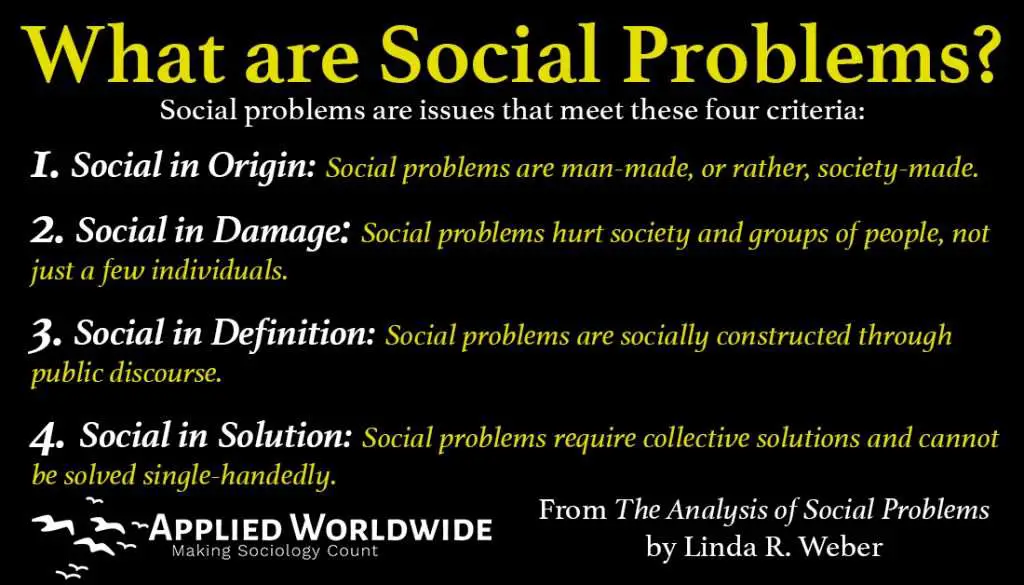Editorial Note:
This article on Nigeria’s social problems is being published on behalf of Applied Worldwide’s 2021 student essay competition. Students were prompted to respond to the question, “Why is sociology important?” We awarded 17 finalists from all over the world, and published those essays over the course of several weeks.
This essay was written by Muib Shefiu, a student at Federal University of Kashere in Nigeria. This essay received a third place award. We had a really great turnout and would like to thank everyone who submitted an essay. We received a wide variety of creative interpretations and responses, so browse our essay directory!
Muib Shefiu
Introduction to Nigeria’s Social Problems
All sociologists are enthusiastic about the experiences of individuals and how those happenings are moulded by interactions with social groups and society as a whole. To a sociologist, the personal decisions an individual makes do not exist in emptiness. Cultural patterns and social forces usually exert pressure on people to select one choice over another. Sociologists around the world majorly identify these general patterns by examining the behaviour of large groups of people living in the same society and experiencing the same societal pressures.
Further Assessment of Nigeria’s Social Problems
Apparently, Nigeria is a blessed country but whose presence has been dropped in shambles with the notion of a better tomorrow. These fake promises have been upheld to maintain the conflict theory propounded by Karl Marx. Karl Marx’s conflict theory sees society as being made up of individuals in different social classes who must compete for social, material, and political resources such as food and housing, employment, education, and leisure time.

Also, social institutions like government, education, and religion indicate this competition in their inherent inequalities. This might be the reasons some individuals and organizations in Nigeria can obtain and keep more resources than others and feed people with the hope of better tomorrow; a method to eliminate the sufferings and agony of the present.
Sociological Study of Nigeria’s Social Problems
As a result, the sociological study of Nigerian societies reveals that Nigeria believes in futuristic promises by paying little or no attention to the present ones. A case study of this can be presented on how people massively vote for leaders who dish out fake promises in the name of manifestoes without asking sociological questions on how they will achieve the promises.
Evidently, sociology as a field helps the members of any institution to solve attitudinal, character, behavioural and social problems to actualize a healthy growth and development of such a society. As a sociologist, I have critically put together a TURN around “social facts” that can better our today and also shape the future. I have in view:
T – Technological-driven Nigeria
U – Unified citizens in addendum with
R – Right governance and
N – a National language

Nigeria as a Technology Driven Nation
Obviously, this is a technological explosive era, and digital innovation has become the focus of global competition. To have a technological-driven nation, a Nigeria that will successfully compete in this e-market, there is a dire need for the governmental organisations, private organisations, and individuals in Nigeria to kick-start actions, policies and strategies; the procedures that will involve scholarships and effective internships which can produce technological geniuses, that can project the future of the country.
Technology and Nigeria’s Social Problems
Furthermore, sociological observation brings to notice that the development in most countries hangs on their ingenuity in the field of technology. The gigantic revenues generated by most developed countries like China, Japan, United States, Dubai and Germany are a result of their endless creativity and innovation in the said field.
If the Americans can be proud of her innovators in 21st-century technology such as Jack Dorsey, Bill Gates, Steve Jobs, Mark Zuckerberg who developed Twitter, Microsoft, Apple, Facebook respectively and the Chinese can be proud of Jack Ma, Eric Yuan who have thrived immeasurably in the e-commerce, nothing is mitigating us from celebrating technological innovators and inventors before the Sapphire Jubilee if we start now; the future starts now.
Reflections on Technology in Nigeria
Apparently, sixty years of celebration is also a reflection of our actions and policies so far in creating a better standard. The educational sector of the country needs quick and swift attention. If we want to compete with the world in this cyber-industrial era, there is a need to move away from the theoretically based curriculum to the effective practical based curriculum. Our focus should be shifted from calculating the momentum of a train from A to B. Sociologically, we do not need that, but rather we need to build a train that travels from A to B.

Significantly, machine and computer languages have become invaluable world assets; there is a need to unconsciously socialise the learning of the languages just like the way human languages are acquired. To do this, the languages like HTML, Python, Prolog, Java etc. need to be broken down and fused into the curriculum at all levels including the formative level. The kids that play with “<p> I want to eat <b> in the dining </p>” will be an adult that will programme a robot or software that will change the face of the world.
A Unified Nigeria
On a national note, we need to start looking forward to a unified Nigeria. A country that will be devoid of regional and ethnical strives. Personally, one of the ways to achieve unity is to remove the constitutional division of “State of Origin, Local Government of Origin” and “The Federal Character Policy.” If being a Nigerian is not enough to live, interact, socialise, work and explore all the nooks and crannies of the thirty-six states, seven hundred and seventy four local governments, then where is the unity?
Right and Inclusive Governance
Exclusion is a mental and sociological pain that no man would like to feel. Thus, this needs to be prevented, for the society needs to work together for inclusive development and growth. By inference, the youth are the workforce of every nation; they have the physical and mental ability to formulate and improvise ideas and policies that can assist the nation in all ramifications.
National Language
A National language is like a band of a national union. This explains that the basis of any independent government is the national language. However, it is highly resentful that a sixty-year old country is still without an identity, a sociological identity. An indigenous language that can integrate all the ethnic groups into an entity called Nigeria, a domestic language that can be spoken by all and understood by all.
Language is definitely a special recognition of each country. The sociological identity of each country is attached to the language; Japan speaks Japanese, China speaks Chinese-Mandarin, United States speaks English, Indonesia speaks Malay etc., but Nigeria speaks hundreds of languages.
The above is a genuine reason for the stakeholder to put heads together and promote an indigenous language to the level of a national language. There are different sociological problems that can be solved with a common language, common language usually brings love, peace and unity.
As a sociologist, I want to go to the deepest area of any region in my country and be welcomed as a countryman. It might be hard, but if a colonised country with different ethnic groups of unique languages like Indonesia can achieve that feat, Nigeria can also reach the height when the necessary effort is expended on the plan. Enough of futuristic policies, the future is now!
Final Thoughts on Sociology and Nigeria’s Social Problems
To this end, I would like to round off with a priceless quote from Émile Durkheim, the “sociological method as we practice it rests wholly on the basic principle that social facts must be studied as things, that is, as realities external to the individual… there can be no sociology unless societies exist, and that societies cannot exist if there are only individuals.” This is to showcase that it is only sociology that can uniformly better the societal system.







